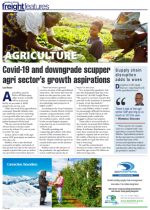African farmers are increasingly mechanising operations as part of longer-term strategies to prioritise agribusiness.According to Jonathan McDonald, general manager of Bester Clearing and Forwarding, volumes of agricultural machinery moving to the likes of Zambia and Zimbabwe are on the rise.“This increased mechanisation of the sector is good news for logistics because it is consistent business.
Not just in the support products such as parts that have to be moved, but also materials such as bags for bagging machines and other items that are needed more regularly.
In South Africa, mechanisation is also on the up, he says.“In the fruit sector in the Eastern Cape and Kwa-Zulu Natal we have seen a particular increase in demand for machines.”
The past few weeks have not been the easiest, he admits. While agriculture for the most part has been seen as an essential service around the world, getting machines out of countries of origin has been challenging.
“Here the machinery was seen as essential, but in some of the countries that was not the case and only the agri products were deemed essential,” says McDonald. “It is probably the biggest challenge at present – what we move freely here may not be the case in other countries due to all the different regulations and different versions of lockdown that have been implemented.”Ultimately this affects the entire supply chain.
“If farmers don’t get the machinery they require, they can’t harvest at the right time and they simply don’t get their products to market on time.”Challenges aside, McDonald is upbeat about the sector which he sees as a beacon of light in the current economic situation brought on by the outbreak of the coronavirus.
“Africa has fairly well-designed mills and crushing plants. Many are dual purpose and are used for more than one commodity, so they will switch from cotton crushing to soy crushing for example. It is a sector that will continue to operate no matter how difficult the conditions,” he explains. “What is positive is that the sector is seen as essential and food security is of critical importance – not only in Africa, but around the world.”But it is by no means an easy business, says McDonald, as it is an industry that can be hard hit by circumstances out of one’s control.
“The drought that hit the region in 2018/19 saw our volumes drop by up to 30%.”But despite the current difficult operating conditions, McDonald says volumes are expected to increase this year thanks to good rains and increased planting.“It is a resilient sector, but they are demanding more and more from their logistics service providers. On our side we are continuously working on solutions to streamline our service for clients, facilitating the smooth movement of cargo at all times.

